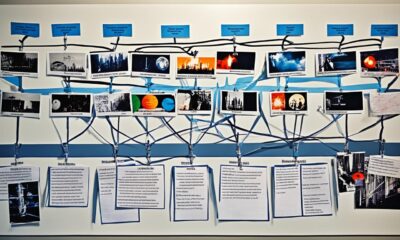Understanding Narcissism
10 Signs Your Sister-in-Law May Be Narcissistic
Step into the delicate world of family dynamics as we uncover the subtle signs of narcissism in your sister-in-law, leaving you intrigued to explore further.

Envision a garden where each blossom vies for sunlight, every one striving to surpass the others in brilliance.
In the same vein, observing certain behaviors in our sister-in-law can raise red flags, hinting at deeper underlying issues.
As we explore the subtle nuances of narcissistic traits in a family member, it becomes evident that understanding these signs is not just about recognition but about equipping ourselves with the necessary tools to navigate such intricate relationships.
Key Takeaways
- Excessive need for admiration and entitlement.
- Constantly seeks external validation and admiration.
- Difficulty accepting criticism, reacts defensively.
- Boundary violation, exploitative tendencies for personal gain.
Excessive Need for Admiration
When a sister-in-law demonstrates an excessive need for admiration, it can be a telling sign of narcissistic behavior. Constantly seeking attention and approval, this individual may engage in attention-seeking behaviors to satisfy their ego.
Fishing for compliments and recognition becomes a common practice as they crave validation to boost their self-esteem. This excessive need for admiration can lead to self-centered behaviors, where the sister-in-law prioritizes her own desires and feelings above others.
Seeking constant approval from family members reinforces this cycle of seeking external validation to feel worthy. Their focus on garnering admiration may overshadow their ability to empathize with others, resulting in a lack of sensitivity towards the feelings and needs of those around them.
Recognizing these behaviors early on can help navigate interactions with a narcissistic sister-in-law and establish boundaries to maintain healthy relationships.
Lack of Empathy Towards Others

We notice warning signs of emotional detachment and a disregard for the feelings of others when dealing with a narcissistic sister-in-law.
Their inability to empathize can lead to a lack of consideration for the emotions and well-being of those around them.
This can create challenges in relationships as they may struggle to connect emotionally with others.
Emotional Detachment Warning Signs
In observing a narcissistic sister-in-law, one may notice a distinct lack of empathy manifested through dismissive attitudes towards others' feelings and needs. This emotional detachment is a warning sign often characterized by a self-absorbed and dismissive demeanor, where she shows little concern for the struggles or challenges faced by those around her.
A key indicator is her consistent pattern of disregarding or minimizing the emotions of others, failing to offer the compassion or understanding that's typically expected in social interactions. This lack of empathy reflects a deep-rooted indifference to the well-being of others, highlighting a significant aspect of her narcissistic tendencies that can strain relationships and create emotional distance within the family dynamic.
Disregard for Others' Feelings
Shifting from the emotional detachment warning signs, a narcissistic sister-in-law's disregard for others' feelings becomes glaringly apparent through her dismissive demeanor and lack of empathy towards those around her. This lack of empathy stems from a self-centered focus, where she prioritizes her own needs over understanding the emotions of others.
Consequently, interactions with her may often result in hurtful behavior, causing emotional distress to those involved. Recognizing this dynamic is important in managing interactions with a narcissistic sister-in-law. By acknowledging her lack of empathy and self-centered tendencies, one can navigate these relationships with a greater sense of awareness and boundary-setting to protect one's own well-being.
Sense of Entitlement

How does a narcissistic sister-in-law's sense of entitlement impact her relationships and interactions with others? A sense of entitlement in a sister-in-law can lead to demanding special treatment and privileges, often at the expense of others. This selfish behavior stems from a lack of empathy and a perceived sense of superiority over those around her. Let's take a closer look at how this entitlement manifests in her interactions:
| Entitlement Behaviors | Impact on Relationships |
|---|---|
| Expects special treatment | Others feel burdened and unappreciated |
| Ignores others' boundaries | Causes discomfort and resentment |
| Disregards social norms | Creates tension and conflict |
| Demands attention/admiration | Leaves little room for others' needs |
Understanding these behaviors can help navigate interactions with a narcissistic sister-in-law. It is essential to set boundaries and communicate effectively to maintain healthy relationships while dealing with her sense of entitlement.
Manipulative Behavior

We've seen how manipulative behavior can be a key trait of narcissistic individuals. Deceptive emotional appeals, gaslighting tactics, and playing the victim card are common strategies they employ.
These behaviors can create confusion, doubt, and emotional turmoil within relationships.
Deceptive Emotional Appeals
Using deceptive emotional appeals, a narcissistic sister-in-law manipulates and controls others, often resorting to tactics like guilt-tripping or playing the victim to achieve her desired outcomes. These manipulative behaviors can create a toxic dynamic in the relationship, leading to emotional distress and difficulty in maintaining healthy boundaries.
It's essential to recognize these tactics for what they are and not fall prey to their effects. Here are key points to keep in mind:
- Deceptive emotional appeals can be used to manipulate your actions and emotions.
- Playing the victim or guilt-tripping are common tactics employed by narcissistic individuals.
- Establishing and enforcing healthy boundaries is vital in dealing with such manipulative behavior.
Gaslighting Tactics
Gaslighting, a manipulative behavior, involves intentionally causing someone to doubt their own reality or sanity. This form of manipulation often includes denying events, shifting blame, and minimizing valid concerns.
Victims of gaslighting may experience self-doubt, confusion, and emotional distress as their perceptions are repeatedly called into question. The important nature of gaslighting can lead individuals to feel isolated, invalidated, and unsure of themselves.
Recognizing these tactics is important for establishing firm boundaries and safeguarding one's mental well-being. By understanding the subtle ways in which gaslighting operates, individuals can protect themselves from falling prey to manipulative behavior and seek the necessary support to maintain a healthy sense of reality.
Playing Victim Card
Playing the victim card is a common manipulative tactic utilized by narcissistic sister-in-laws to control narratives and garner emotional support from others. This behavior can be detrimental to relationships and emotional well-being.
Here are three key aspects to take into account when dealing with a sister-in-law who plays the victim card:
- Manipulative Behavior: Recognize the manipulation tactics employed, such as twisting facts and exaggerating incidents to portray themselves as innocent.
- Setting Boundaries: Establish clear boundaries to protect yourself from being emotionally manipulated or guilt-tripped.
- Maintaining Emotional Distance: Keep a level of emotional distance to prevent yourself from being drawn into their narratives and maintain clarity in your interactions.
Constantly Seeking Validation

Often craving external validation, a narcissistic sister-in-law may exhibit attention-seeking behavior to fulfill her constant need for admiration. Seeking approval and praise frequently can be a sign of narcissism in a sister-in-law. The need for external validation may drive her actions and interactions with others. Seeking validation excessively may indicate underlying insecurities and a fragile self-image in a narcissistic sister-in-law.
| Signs of Constant Validation in a Narcissistic Sister-in-Law | How It Manifests |
|---|---|
| Seeks constant approval and admiration from others | Attention-seeking behavior |
| Craves external validation to feel validated | Constant need for admiration |
| Relies on others' opinions to shape self-worth | Insecurities and fragile self-image |
| Expects praise and recognition for even minor accomplishments | Validation-seeking actions |
| Struggles with self-assurance without external validation | Dependent on external validation |
Understanding these behaviors can help navigate interactions with a narcissistic sister-in-law who constantly seeks validation. It is essential to set boundaries and offer support while also addressing the deeper insecurities driving her need for external validation.
Difficulty Accepting Criticism

When faced with criticism, a narcissistic sister-in-law commonly struggles to accept feedback, often responding defensively or dismissively. This difficulty in receiving criticism can have a major impact on the relationship dynamics and communication between family members. Here are some signs that may indicate your sister-in-law's narcissistic tendencies when it comes to accepting criticism:
- Handling Reactions: Criticism may trigger hostile or angry responses from your sister-in-law, escalating conflicts and tensions within the family.
- Perceived Personal Attacks: Constructive feedback might be misconstrued as a direct assault on her character, leading to a defensive stance and resistance to self-reflection.
- Avoiding Responsibility: Instead of acknowledging mistakes or shortcomings, a narcissistic sister-in-law may deflect blame, deny responsibility, or manipulate the situation to evade facing the repercussions of her actions.
Dealing with the challenges posed by a sister-in-law's defensive response to criticism requires patience, understanding, and clear boundaries to maintain healthy relationships within the family.
Competitive Nature

Displaying a competitive nature, a narcissistic sister-in-law often endeavors to outshine others through constant comparison and one-upmanship. This behavior stems from her constant need for attention and admiration, which drives her to seek validation by proving her superiority over those around her.
In family settings, her competitive nature can create tension and conflict, as she's unwilling to share the spotlight and may resort to undermining or belittling others to maintain her perceived dominance. The one-upmanship game she plays can leave family members feeling inadequate and insecure, as every interaction becomes a subtle competition where she must come out on top.
This dynamic not only affects individual relationships but can also disrupt the harmony within the family unit, leading to strained interactions and heightened stress levels. Recognizing and addressing the impact of a narcissistic sister-in-law's competitive behavior is essential in handling the complexities of family dynamics and fostering healthier relationships within the family.
Boundary Violation

Managing a relationship with a narcissistic sister-in-law who displays boundary violation can be challenging due to her tendency to intrude into personal space and affairs without permission. Recognizing the signs of a manipulative sister-in-law who constantly oversteps boundaries is important in dealing with a toxic family dynamic. To effectively navigate this difficult situation, setting clear boundaries and assertively communicating your need for personal space and privacy is vital.
Here are three key indicators of boundary violation by a narcissistic sister-in-law:
- Disregarding Privacy: Constantly prying into personal matters and sharing confidential information without consent.
- Ignoring Boundaries: Showing a lack of respect for your personal space and disregarding the limits you have set.
- Interfering in Decisions: Overstepping by involving themselves in choices that should be between you and your spouse, creating discomfort and tension within the family.
Recognizing and addressing these boundary violations is important for maintaining your well-being and setting a healthy family dynamic.
Exploitative Tendencies

Recognizing the exploitative tendencies of a narcissistic sister-in-law is important in safeguarding oneself from manipulation and setting healthy boundaries within the family dynamic. When dealing with a sister-in-law who exhibits manipulative behavior, it's vital to protect yourself and maintain your well-being. Here is a table highlighting key exploitative tendencies that may help you identify and address such behaviors effectively:
| Exploitative Tendencies | Description | Impact |
|---|---|---|
| Using others for gain | Exploiting relationships for personal benefit | Emotional harm |
| Manipulating situations | Twisting events to suit personal needs | Undermining trust |
| Taking advantage | Exploiting family dynamics for self-gain | Disrupting harmony |
| Seeking attention | Craving admiration and control | Creating tension |
| Sense of entitlement | Believing in superiority and special treatment | Alienating others |
Understanding these exploitative patterns can empower you to protect yourself, establish clear boundaries, and navigate family dynamics more effectively. Setting limits with a narcissistic sister-in-law can help prevent being taken advantage of and maintain healthier relationships within the family.
Grandiose Sense of Self

After identifying exploitative tendencies in a narcissistic sister-in-law, it becomes apparent that one prominent characteristic often observed is a grandiose sense of self. This inflated ego leads her to seek admiration and attention constantly. Here are some key behaviors to look out for:
- Inflated Ego: A narcissistic sister-in-law may exaggerate her achievements and talents to appear more impressive, showcasing a grandiose sense of self.
- Entitlement: This behavior can manifest as a need for special treatment and entitlement in various situations, where she believes she deserves more than others.
- Superiority Complex: Displaying superiority and looking down on others are common traits of a sister-in-law with narcissistic tendencies, as she perceives herself as above those around her.
Understanding these signs of a grandiose sense of self can help navigate challenging interactions with a narcissistic sister-in-law. Approaching such situations with empathy and a clear understanding of the dynamics at play is crucial.
Are Narcissistic Traits Genetic and Can Be Passed Down from Mother to Daughter?
Yes, signs of a covert narcissistic mother can be passed down from generation to generation. Some research suggests that narcissistic traits may have a genetic component and can be passed down from parent to child. However, it is important to note that the environment also plays a significant role in the development of narcissistic traits.
Could Narcissistic Sibling Triangulation be a Sign that my Sister-in-Law Is Narcissistic?
Narcissistic sibling triangulation explanation can indicate that your sister-in-law may be narcissistic. This behavior involves manipulating family members against each other to maintain control. If you notice her pitting family members against each other and creating conflict, it may be a red flag of her narcissistic tendencies.
Conclusion
To sum up, managing relationships with a narcissistic sister-in-law can be like walking a tightrope in a circus. It requires balance, agility, and a steady hand to maintain boundaries while still keeping peace within the family.
By recognizing the signs and implementing strategies to manage the dynamics, we can create a harmonious environment where everyone's needs are respected. Remember, staying grounded and focused on your own well-being is key in handling challenging individuals with grace.
Covert Narcissist
What Makes a Covert Narcissist Different from an Avoidant?
Analyze the intricate behaviors of a covert narcissist or avoidant individual, unraveling the fine line between self-absorption and emotional distance.

The saying ‘actions speak louder than words’ is particularly relevant when differentiating between a covert narcissist and someone with avoidant tendencies within the realm of character traits. The specific behaviors exhibited by individuals with these personality types often cause uncertainty regarding their true motivations and intricate emotions.
As we navigate through the intricate web of characteristics and relational patterns associated with these traits, a deeper understanding of the driving forces behind each persona unveils a fascinating journey into the complexities of human behavior.
Key Takeaways
- Covert narcissists manipulate through gaslighting, lack empathy, and have fragile self-esteem.
- Avoidant individuals fear rejection, struggle with intimacy, and have difficulty expressing emotions.
- Differentiate between covert narcissists and avoidant individuals to navigate relationships effectively.
- Setting boundaries and practicing self-care are crucial in managing interactions with these individuals.
Understanding Covert Narcissistic Behaviors
In understanding covert narcissistic behaviors, it's crucial to recognize the subtle manipulation tactics employed by individuals who exhibit this personality trait. Covert narcissists often display an avoidant attachment style characterized by a strong need for admiration and a lack of empathy towards others. This attachment style stems from underlying feelings of inadequacy and a fragile self-esteem, leading them to seek validation through controlling and manipulating others.
Individuals with covert narcissism may use tactics such as gaslighting, where they distort reality to make their victims doubt their own perceptions and memories. By eroding their victim's sense of reality, covert narcissists gain power and control over them. This manipulation is a key feature of their narcissistic behavior, allowing them to maintain a facade of superiority and self-importance.
Understanding the interplay between avoidant attachment styles and narcissism is crucial in identifying and dealing with covert narcissistic behaviors. By recognizing these subtle manipulation tactics, individuals can better protect themselves from falling victim to the harmful effects of covert narcissists.
Signs of Avoidant Personality Traits

Having understood the manipulation tactics of covert narcissists, it's imperative to recognize the signs of avoidant personality traits that often accompany such behaviors. Avoidant individuals may exhibit the following characteristics:
- Avoidance of intimacy and emotional closeness in relationships.
- Fear of rejection and low self-esteem leading to social withdrawal.
- Difficulty expressing emotions and reluctance to seek help or support.
- Preferring solitary activities and avoiding social interactions.
These traits can stem from various factors, including childhood attachment patterns. Individuals with avoidant attachment styles may struggle with forming secure emotional connections due to past experiences. This can lead to a tendency to withdraw from relationships to protect themselves from perceived rejection or vulnerability.
Understanding these signs can help differentiate between covert narcissistic behaviors and avoidant personality traits, shedding light on the complexities of interpersonal dynamics. Furthermore, recognizing these patterns can aid in addressing underlying issues and fostering healthier relationships.
Impact on Relationships
The impact of avoidant personality traits on relationships can manifest in various ways, affecting both individuals involved. Avoidant individuals often struggle with forming secure attachments, which can lead to challenges in establishing and maintaining healthy adult relationships. Let's delve into the specific impacts on relationships through the table below:
| Impact on Relationships | Description |
|---|---|
| Difficulty with Intimacy | Avoidants may have difficulty opening up emotionally, leading to a lack of intimacy in relationships. |
| Fear of Rejection | Due to their fear of rejection, avoidant individuals may push partners away or avoid commitment altogether. |
| Communication Issues | Avoidants often struggle with effective communication, leading to misunderstandings and conflicts in relationships. |
Understanding these impacts is crucial in navigating relationships with individuals exhibiting avoidant traits. It's important to differentiate between avoidant behaviors and narcissistic personality disorder, as the underlying motivations and dynamics in relationships can vary significantly.
Differentiating Covert Narcissists and Avoidant Individuals

Upon examining the distinct characteristics of covert narcissists and avoidant individuals in relationships, it becomes evident that their behaviors and underlying motivations diverge significantly. When differentiating between covert narcissists and avoidant individuals, several key points emerge:
- Covert narcissists excel at masking their true intentions, seeking admiration and control, while avoidant individuals are more inclined to shun intimacy due to fear of rejection.
- Covert narcissists often employ false humility to garner trust and sympathy, whereas avoidant individuals may struggle with self-esteem and play down their accomplishments.
- Covert narcissists actively seek attention and manipulate situations to be the center of focus, while avoidant individuals prefer to evade attention and remain in the background.
- Covert narcissism is characterized by an unquenchable thirst for admiration and a tendency towards manipulation, whereas avoidant individuals harbor a deep-rooted dread of rejection and encounter difficulties in establishing intimate connections.
Understanding these distinctions can aid in recognizing and navigating relationships with individuals who exhibit traits of either covert narcissism or avoidance.
Coping Strategies and Setting Boundaries
To effectively navigate relationships with individuals displaying traits of covert narcissism or avoidance, implementing and maintaining clear boundaries is essential. When dealing with covert narcissists or avoidant individuals, establishing boundaries helps protect against manipulation and emotional harm.
It's crucial to clearly communicate your limits and expectations to maintain a healthy dynamic. Additionally, practicing coping strategies such as self-care, assertiveness, and seeking support from trusted individuals like friends, family, or therapists can aid in managing interactions with these personality types.
Prioritizing self-care activities that bring joy and fulfillment can help in maintaining emotional well-being. Learning to assertively express needs and feelings without fear of manipulation is key in setting boundaries with covert narcissists or avoidant individuals.
Limiting contact with these individuals when possible can also safeguard emotional health and reinforce boundaries. By incorporating these coping strategies and setting clear boundaries, one can navigate relationships with covert narcissists or avoidant individuals more effectively.
Frequently Asked Questions
Am I Avoidant or Narcissist?
We often question our behavior and tendencies, wondering if we fall into certain psychological categories. It's natural to reflect on our actions and personalities, seeking to understand ourselves better.
Identifying whether we exhibit avoidant or narcissistic traits can provide insight into our emotional patterns and relationships. Self-awareness is a key step in personal growth and development, allowing us to address areas where we may need to make positive changes.
What Can Be Mistaken for Covert Narcissism?
When examining behaviors that can be confused with covert narcissism, it's crucial to consider traits like introversion, shyness, or social anxiety. These characteristics may manifest similarly to covert narcissistic tendencies, such as avoiding social interactions or seeking validation through subtle means.
Understanding the nuances between these traits is essential in accurately identifying covert narcissism and differentiating it from other personality traits or disorders.
What Are the Red Flags of a Covert Narcissist?
When assessing potential red flags of covert narcissism, observing patterns of behavior is crucial. Look for signs of manipulation, lack of empathy, grandiosity, and a constant need for admiration.
Pay attention to how they interact with others, especially in social settings or when faced with criticism. Keep an eye out for subtle but persistent displays of entitlement and a tendency to exploit others for personal gain.
These behaviors can indicate underlying narcissistic traits.
What Hurts a Covert Narcissist the Most?
Criticism or rejection can deeply wound individuals who seek external validation, control, and admiration.
Failure to manipulate or threats to their grandiose fantasies can also trigger intense hurt.
Such individuals may struggle with feelings of inferiority, invisibility, and a fragile self-image.
Understanding these vulnerabilities can shed light on what truly affects them at their core.
Is the Behavior of a Covert Narcissist Related to Their Constant Illness?
The covert narcissist’s constant sickness may be a manipulation tactic to garner sympathy and attention. By portraying themselves as perpetually unwell, they seek to control others’ perceptions and elicit constant care and attention. This behavior aligns with their need for admiration and validation, perpetuating their narcissistic traits.
Conclusion
In conclusion, navigating relationships with individuals exhibiting covert narcissistic behaviors or avoidant attachment can be challenging. It's like walking a tightrope, balancing between their need for validation and fear of intimacy.
Setting boundaries and practicing self-care are crucial in maintaining healthy interactions with these personality types. Remember, understanding their underlying motivations can help in managing expectations and protecting your emotional well-being.
Chris brings a wealth of knowledge and personal experience to the role of Expert Author. With a focus on narcissistic personality disorder and recovery processes, Chris’s articles offer a mix of expert analysis, personal anecdotes, and actionable advice. Their work enriches our platform with depth, authenticity, and a perspective that resonates with those who have experienced narcissism firsthand.
Narcissism Test
Discover Your Inner Narcissist: You Quiz
Intrigued to uncover hidden traits? Take the 'How Narcissist Are You Quiz' and delve into the spectrum of narcissistic tendencies.

Have you ever thought about how self-awareness can shed light on different aspects of our personalities in our everyday interactions? Do you ever wonder how your level of self-reflection compares to that of others?
The 'How Narcissist Are You Quiz' unveils a spectrum of narcissistic tendencies that might surprise you. Let's explore how this quiz can offer a glimpse into our psyche and potentially challenge our perceptions of self-image.
Key Takeaways
- Online quizzes are not diagnostic tools for narcissistic personality disorder.
- Self-reflection allows introspection and analysis of actions, thoughts, and emotions.
- Analyzing conduct provides valuable insights and fosters healthier relationships.
- Seek guidance from mental health professionals for understanding and addressing tendencies.
Understanding Narcissism Through a Quiz
Exploring narcissism through a quiz can provide insights into the traits associated with narcissistic personality disorder. Narcissistic traits such as grandiosity, lack of empathy, and manipulation are often fundamental aspects of this disorder. By engaging with a narcissism quiz, individuals may gain a better understanding of these characteristics and how they manifest in their own behavior.
While such quizzes can serve as a preliminary screening tool, it's essential to recognize their limitations. Online quizzes aren't diagnostic tools and shouldn't be solely relied upon for a definitive diagnosis of narcissistic personality disorder. Instead, they can prompt individuals to reflect on their behaviors and seek further evaluation from mental health professionals if necessary.
To truly comprehend the complexities of narcissistic personality disorder, one must undergo a comprehensive assessment by a qualified specialist. Seeking professional help is crucial for an accurate diagnosis and the development of an appropriate treatment plan tailored to the individual's specific needs and circumstances.
Self-Reflection on Narcissistic Behaviors

After considering the limitations of online quizzes in diagnosing narcissistic personality disorder, it becomes imperative to engage in self-reflection on our own behaviors that may align with narcissistic traits. Self-reflection allows us to introspect and analyze our actions, thoughts, and emotions for signs of narcissistic tendencies. To aid in this process, a structured approach can be helpful. The table below outlines key behaviors associated with narcissistic personality disorder for self-assessment:
| Narcissistic Behavior | Description | Self-Reflection |
|---|---|---|
| Grandiosity | Exaggerated sense of self-importance | Have I displayed an inflated ego? |
| Lack of Empathy | Difficulty understanding others' feelings | Have I been insensitive to others' emotions? |
| Need for Admiration | Constant seeking of praise and admiration | Do I constantly seek validation from others? |
| Sense of Entitlement | Belief in special treatment and privileges | Have I expected special treatment in situations? |
Analyzing our conduct through this lens can provide valuable insights into our personalities and help in fostering healthier relationships.
Exploring Narcissistic Tendencies Together
Together, we'll delve into the manifestations of narcissistic tendencies within interpersonal relationships to enhance our understanding and foster a supportive environment for growth.
When exploring narcissistic behaviors in relationships, it's crucial to distinguish between normal self-interest and the traits associated with Narcissistic Personality Disorder (NPD). Individuals with NPD often exhibit a grandiose sense of self-importance, a constant need for admiration, and a lack of empathy for others. These characteristics can significantly impact how they interact with those around them, leading to strained relationships and emotional distress for both parties involved.
In today's digital age, social media platforms can amplify narcissistic tendencies, providing individuals with NPD a stage to seek validation and attention on a broader scale. The instant gratification and validation received through likes, comments, and followers can fuel their narcissistic traits, reinforcing their belief in their superiority and entitlement.
Assessing Your Narcissistic Traits

Within interpersonal relationships, understanding and recognizing one's narcissistic traits is essential for fostering personal growth and maintaining healthy dynamics. When assessing your narcissistic tendencies, it's crucial to approach the evaluation with a reflective and open mindset. Here are some key points to consider:
- Causes of Narcissistic Personality: Delve into the root causes that may have contributed to the development of narcissistic traits, such as childhood experiences or past relationships.
- Consulting a Mental Health Professional: Seeking guidance from a mental health professional can provide valuable insights and support in understanding and addressing narcissistic tendencies.
- Inflated Sense of Self-Importance: Reflect on instances where you may have exhibited an inflated sense of self-importance or a constant need for admiration from others.
- Impact on Interpersonal Relationships: Evaluate how your narcissistic traits impact your relationships with others and consider the feedback you receive from those around you.
- Self-Reflection and Growth: Engage in self-reflection to identify areas for personal growth and work towards cultivating healthier relationship dynamics.
Insights Into Your Personality: The Narcissism Quiz
The Narcissism Quiz provides a structured assessment tool to evaluate narcissistic behaviors and offer insights into one's personality. By answering a series of multiple-choice questions that reflect narcissistic tendencies, individuals can gain a better understanding of their own behavior patterns.
This quiz isn't a diagnostic tool for Narcissistic Personality Disorder (NPD) but can help determine whether certain traits align with narcissistic characteristics inspired by Greek mythology.
The results of the quiz are anonymous, allowing participants to reflect on their responses without fear of judgment. It's essential to approach the findings with an open mind and consider seeking guidance from a mental health professional if concerns about narcissistic traits arise.
Frequently Asked Questions
How Do You Check if You Are a Narcissist?
We assess narcissistic tendencies by reflecting on our behaviors, thoughts, and interactions with others. Observing how we prioritize our own needs over those of others, seek excessive admiration, or lack empathy can provide insights.
Engaging in self-reflection, seeking feedback from trusted individuals, and considering professional evaluation are valuable steps in evaluating potential narcissistic traits.
Awareness and willingness to address these aspects can be crucial for personal growth and healthier relationships.
What Is the One Question to Identify a Narcissist?
We can identify a potential narcissist by asking if they believe they're more special or unique than others. A resounding 'yes' to this question may indicate narcissistic tendencies.
It's important to distinguish between healthy self-esteem and exaggerated self-importance. However, this question alone isn't a definitive diagnosis of narcissistic personality disorder.
Seeking a professional evaluation from a mental health expert is crucial for an accurate assessment.
What Words Can Destroy a Narcissist?
We've explored how criticism, rejection, ignoring, accountability, and empathy can deeply affect a narcissist. These words have the power to pierce through their facade of superiority and self-centeredness, challenging their fragile ego and sense of self-worth. Understanding these triggers can help us navigate interactions with narcissistic individuals more effectively, promoting healthier relationships and boundaries.
It's crucial to approach such situations with empathy and caution, recognizing the complexities at play.
Can a Narcissist Cry Easily?
Yes, narcissists can cry, but it's typically not genuine. Their tears often serve a manipulative purpose, such as to elicit sympathy or control others. When they do cry, it's usually driven by self-pity or to further their own agenda.
These emotional displays are short-lived and quickly revert back to their self-centered focus.
It's essential to recognize that not all individuals who cry easily exhibit narcissistic traits, as crying is a normal and healthy response.
Conclusion
In conclusion, taking the 'How Narcissist Are You Quiz' can provide valuable insights into your level of narcissism.
It's important to remember that self-awareness is key to personal growth and building healthy relationships.
Just like a mirror reflecting our inner selves, this quiz serves as a tool to help us understand and address our behaviors.
Remember, seeking professional help is always recommended for accurate diagnosis and treatment.
Our Content Strategist, Jordan, has a knack for deciphering the digital landscape to determine what our audience seeks. With a foundation in behavioral science and digital marketing, Jordan crafts our content strategy, ensuring that our topics are relevant, research-based, and resonant. Their strategic approach helps Narcissistic Man reach hearts and minds across the globe.
Covert Narcissist
Unveiling the Covert Narcissist’s Final Discard Tactics
Beware the covert narcissist's final discard – uncover the unsettling aftermath and psychological implications that linger long after.

It might be surprising, but studies show that nearly 20% of individuals could encounter a covert narcissist during their lifetime.
The covert narcissist's final discard is a complex and often painful experience that can leave lasting emotional scars. Understanding the intricacies of this behavior can offer insight into the manipulation and psychological impact it can have on those involved.
Exploring the warning signs and aftermath of such a discard can shed light on the dynamics at play and provide a path to healing and recovery.
Key Takeaways
- Gradual withdrawal and manipulation are warning signs of covert narcissist discard.
- Emotional devastation and questioning of reality are common after covert narcissist discard.
- Focus on self-care, therapy, and setting boundaries for coping after covert narcissist discard.
- Seek professional help and surround yourself with a supportive network for healing from covert narcissist abandonment.
Warning Signs of Covert Narcissist Discard
During the discard phase, covert narcissists often gradually withdraw, decrease communication, and engage in subtle manipulative behaviors to undermine the victim's confidence.
Signs of a subtle covert narcissist discard can include setting unclear boundaries, invading personal space, and withholding emotional support.
As the fragile self-esteem of the victim becomes apparent, the covert narcissist may use manipulation tactics such as deflecting blame onto the victim. They may leave you feeling isolated and confused as the narcissist decides when to provide affection and when to withdraw it.
It's essential to recognize these warning signs early on to protect oneself from further emotional harm. By establishing and enforcing personal boundaries, individuals can begin to mitigate the damaging effects of a covert narcissist's discard phase.
Understanding these manipulation tactics is crucial in breaking free from the cycle of emotional abuse perpetuated by covert narcissists.
Emotional Impact of Final Discard

The emotional aftermath of being finally discarded by a covert narcissist can be overwhelmingly devastating, leaving individuals shattered and questioning their self-worth.
Covert narcissists wield power and control in relationships, manipulating emotions to serve their needs.
The discard phase is emotionally draining, as the partner realizes they were merely an object of attention that can be easily cast aside. This act of abandonment can shatter established boundaries, leaving the individual feeling used and disposable.
The covert narcissist's ability to manipulate your emotions can leave you feeling emotionally unstable and questioning your own reality.
The impact of narcissistic abuse can be profound, requiring extensive healing to regain a sense of self-worth and rebuild damaged self-esteem.
The final discard serves as a harsh awakening to the true nature of the covert narcissist, revealing the depth of manipulation and emotional turmoil endured throughout the relationship.
Coping Strategies After Narcissist's Discard
Navigating the aftermath of a covert narcissist's final discard involves implementing essential coping strategies to facilitate healing and reclaiming one's sense of self-worth. After experiencing a narcissist's discard, it's crucial to focus on self-care and prioritize well-being. Seeking therapy or counseling can help process emotions and heal from the trauma. Building a supportive network of friends and family who understand and validate your experiences is essential. Setting boundaries to protect oneself from further manipulation or abuse is key. Additionally, practicing self-compassion and reminding oneself that the discard wasn't their fault can aid in the healing process.
- Acknowledge that the narcissist's behavior is a result of their personality disorder, not your fault.
- Engage in self-reflection to recognize any contribution to the dysfunctional relationship.
- Consider the discard as an opportunity to heal and move on, rather than wanting the narcissist back.
- Implement no contact with the narcissist to aid in the healing process, despite potential hoovering attempts.
- Respond to the discard phase with self-respect, dignity, and a focus on your own well-being.
Recognizing Manipulation Before Discard

When detecting manipulation before a discard by a covert narcissist, it's crucial to pay close attention to subtle behavioral shifts and communication patterns. Recognizing the signs of emotional withdrawal, decreased communication, and the withholding of emotional support and affection can be key indicators of manipulation during the discard phase.
Covert narcissists often display a lack of empathy and employ manipulative tactics, such as undermining confidence through criticism and selective memory. It's important to be aware of the narcissistic cycle of abuse, which typically includes idealization, devaluation, and ultimately, discard.
Additionally, being attuned to dismissive responses, avoidance of sensitive topics, passive-aggressiveness, and attempts to isolate you from loved ones can help in identifying manipulation tactics.
Trusting your instincts and acknowledging the possibility of a devastating final discard can prepare you for the challenging dynamics of a relationship with a covert narcissist. Stay vigilant for inconsistencies in behavior, emotional coldness, and manipulative charm as warning signs of impending discard.
Healing From Covert Narcissist's Abandonment
Understanding the psychological impact of covert narcissist's abandonment is crucial for initiating the healing process and reclaiming one's sense of self-worth. When healing from covert narcissist's abandonment, it's essential to:
- Acknowledge the deep emotional wounds inflicted by the final discard.
- Recognize the insidious tactics covert narcissists use to manipulate and control.
- Seek professional help if needed to navigate the complex emotions and trauma.
- Establish boundaries to protect yourself from further harm.
- Surround yourself with a supportive network of friends, family, or therapists who can provide empathy and guidance.
Healing from covert narcissist's abandonment involves unraveling the web of manipulation and rebuilding your self-esteem. By understanding the dynamics of the relationship with a covert narcissist and taking proactive steps towards healing, you can emerge stronger and more resilient.
Frequently Asked Questions
Do Narcissists Come Back After Final Discard?
Yes, narcissists can come back after the final discard. Their return may stem from a desire to regain control or seek a new source of narcissistic supply. Setting boundaries and focusing on healing are crucial post-discard.
No contact can aid in this process, though the narcissist may try to hoover the victim back in. It's essential to prioritize self-care and recognize that the narcissist's behavior is a result of their disorder, not the victim's actions.
Does a Covert Narcissist Permanently Discard?
Yes, covert narcissists often permanently discard their partners once their needs are no longer met. This final discard can be emotionally devastating, revealing the narcissist's true nature.
The lack of closure can leave partners grappling for answers, leading to trauma and the need for recovery. Covert narcissists employ dismissive tactics, criticism, and manipulation to maintain control, ultimately causing harm before abruptly losing interest.
When a Narcissist Finally Discards You?
When a narcissist finally discards you, it can be a profoundly painful experience. The sudden end of a relationship can leave us feeling lost and hurt.
It's crucial to remember that our worth isn't defined by their actions. Seeking support and therapy can help us navigate the emotional aftermath and rebuild our sense of self.
What Happens to a Covert Narcissist in the End?
In the end, covert narcissists often struggle to maintain lasting relationships due to their inability to form genuine connections. They may continue seeking narcissistic supply from new sources, perpetuating a cycle of emotional devastation.
Their dismissive behavior, insincere responses, and avoidance of sensitive topics can be damaging. Additionally, their undermining of confidence through subtle criticism and manipulation tactics can erode self-esteem.
This pattern of behavior can lead to trauma and the need for narcissistic abuse recovery.
What are the Final Discard Tactics of a Covert Narcissist Compared to those of someone with BPD?
When it comes to bpd vs covert narcissist differences, the final discard tactics can vary. Covert narcissists may silently withdraw and leave without explanation, while individuals with BPD may have emotional outbursts and then cut off contact abruptly. Both can be painful and confusing for the person on the receiving end.
Conclusion
In conclusion, the final discard by a covert narcissist is akin to an emotional earthquake, leaving behind a trail of devastation and heartache.
The impact of this abandonment can be profound, requiring a journey of healing and self-discovery.
It serves as a stark reminder of the insidious nature of narcissistic abuse and the importance of recognizing manipulation before it's too late.
It's a painful but necessary step towards reclaiming one's sense of self-worth and rebuilding a life free from toxic relationships.
-

 How To Deal with Narcissism2 weeks ago
How To Deal with Narcissism2 weeks agoNarcissist Return Timeline: Factors & Predictions
-

 Covert Narcissist1 week ago
Covert Narcissist1 week agoThe Final Covert Narcissist Discard: Signs to Watch For
-

 Divorcing a Narcissist3 months ago
Divorcing a Narcissist3 months agoHealing Together: Support Groups for Narcissistic Abuse Survivors
-

 Covert Narcissist3 months ago
Covert Narcissist3 months ago10 Celebrities Who Display Covert Narcissist Behavior
-

 Narcissistic Cheating Patterns3 months ago
Narcissistic Cheating Patterns3 months agoUnveiling Habits: Cheating Narcissist at Home Post-Affair
-

 How To Deal with Narcissism4 weeks ago
How To Deal with Narcissism4 weeks agoOutsmarting a Narcissist in Court: Strategies to Beat Them
-

 Covert Narcissist1 week ago
Covert Narcissist1 week agoWhat Are the Signs of Covert Narcissist Stalking?
-

 How To Deal with Narcissism4 weeks ago
How To Deal with Narcissism4 weeks agoHow to Make a Narcissist Want You Sexually: A Step-by-Step Guide



















